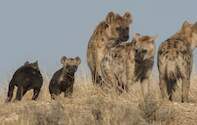

The ongoing hyena research in and around Skukuza in the Kruger National Park has moved to the next level.
Brad Ryan, a Masters student from the Mammal Research Institute at the University of Pretoria, has been doing the fieldwork component of his study over the last two weeks.
This has involved collecting faecal (dung) samples from the Doispan and Skukuza hyenas in the study, which he is now busy analysing in Pretoria. Brad is looking to see to if the animals around Skukuza show evidence of unnatural food in their diet compared to those that live away from a camp environment.
These so-called unnatural components of their diet could be plastics or packaging items that hyenas may scavenge on while moving around the edges of the camp and in the staff village. At the same time Brad will also be able to examine the prey animals that the hyenas are eating by identifying samples of hair from the faeces. Results of the first stage of analysis have uncovered scraps of plastic and string from the Skukuza animals. Attempts to collar more animals for the study are continuing.
A large concerted effort by just about everybody in Veterinary Wildlife Services, has been needed to try and catch the hyenas at Doispan, which are extremely shy of humans. Large carnivore research is seldom done in isolation and it takes a team to get the work done.
Special thanks must go to the Skukuza section ranger, Albert Smith, the Skukuza vets Markus Hofmeyr, Peter Buss and Danny Govender and operations co-ordinator Marius Kruger for their patience in all the unsuccessful attempts to lure the Doispan hyenas in close enough so they can be darted.
Finally, Bran, a large adult male at Doispan, has now been fitted with a tag collar. These tag collars transmit a signal that is picked up by a receiver box at set times of day. The strength of the signal then gives an indication of how far away the hyena is from the receiver.

These collars are useful for determining how much time animals spend at the den. In addition, a GPS collar has now been put on to Elizabé, the dominant female in Skukuza. It will now be possible to monitor her daily movements and see which of the other collared animals in Skukuza she is associating with.
This might provide more information on the nightly antics of the hyenas living around Skukuza and reveal the intricacies of their complex social systems.
Unfortunately the Skukuza hyenas have moved their den away from the road. Elizabé’s collar, however, has allowed accurate location of the den. The collared order hyenas will be closely monitored, their movements and behaviour carefully noted in the database, to build more information for this valuable project.
Learn more about the Brown Hyena and Spotted Hyaena
By Michele Hofmeyr and Lydia Belton

 Brown Hyena [Hyaena brunnea]. This creature has pointed ears and striped legs with a dark brown to black shaggy coat, white shoulders and ne...
Brown Hyena [Hyaena brunnea]. This creature has pointed ears and striped legs with a dark brown to black shaggy coat, white shoulders and ne... One of the characteristic predators of the African savannah the Spotted Hyena was long thought to be solely a scavenger but it is no known t...
One of the characteristic predators of the African savannah the Spotted Hyena was long thought to be solely a scavenger but it is no known t...